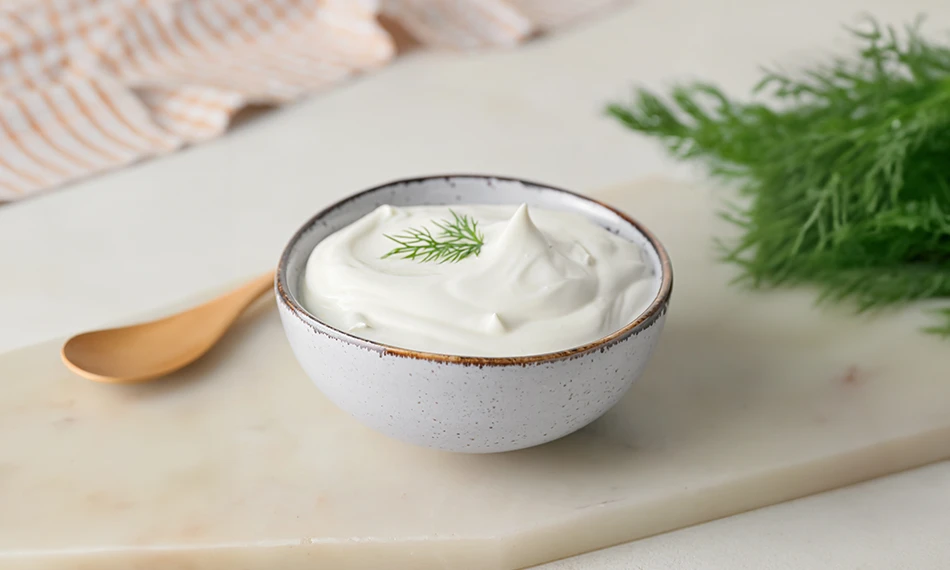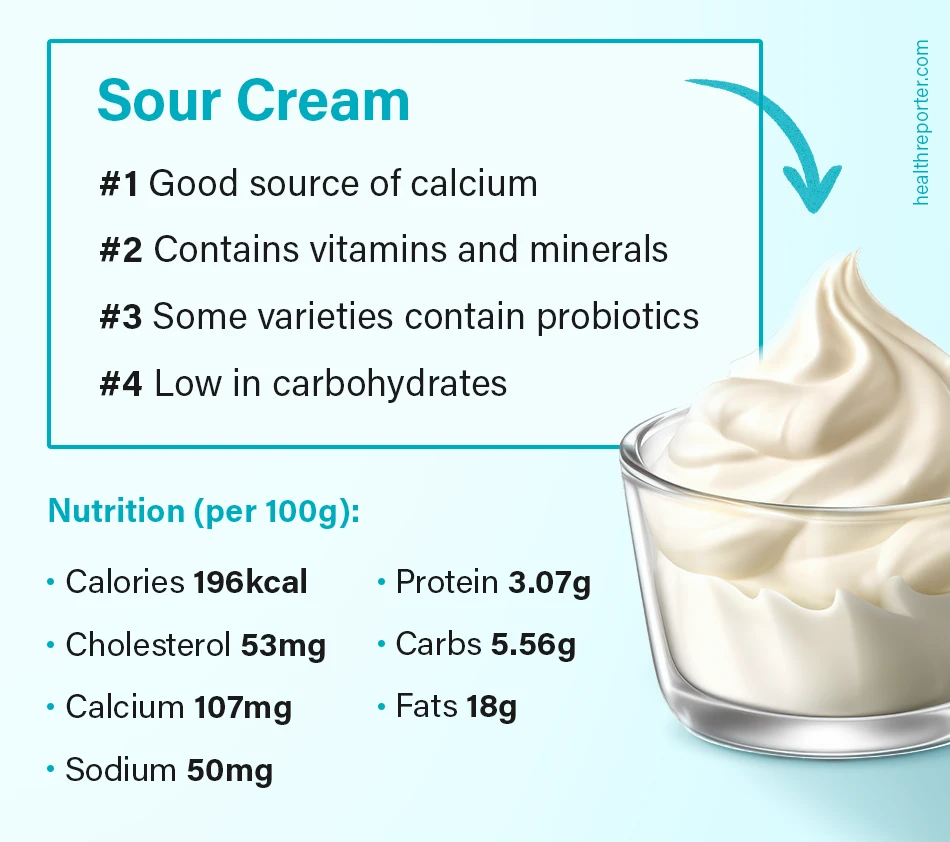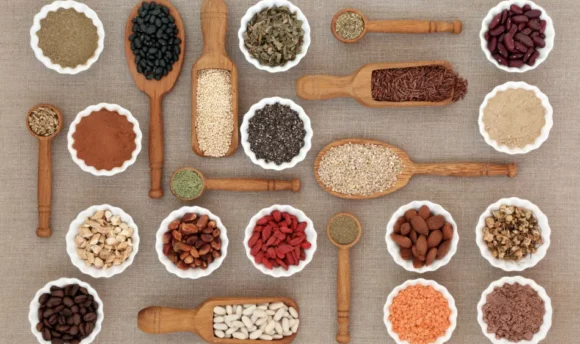Is Sour Cream Healthy? Health Facts You Need to Know
Is your favorite topping holding you back? Our team evaluates its health benefits and downsides.

Sour cream is a food with a characteristic sour taste that is the result of the fermentation of lactic acid bacteria. This process gives it a special place in the kitchen for preparing various savory or even sweet dishes.
While keto enthusiasts may have it at the top of their menu, those on a low-fat diet may want to take a few considerations into account before using it. Stick around to find out how to use it in your recipes and learn about its nutritional value.
Is Sour Cream Healthy?
As part of a balanced diet, sour cream can be enjoyed, but its healthiness depends on a number of factors. In addition to its nutritional benefits, sour cream also has a high calorie, fat, and nutrient content.
Its consistency is achieved by fermenting cream with added bacteria, and it provides good quality protein, vitamins, minerals, and probiotics important for populating the gut with good bacteria.

Types of sour cream
Different types of sour cream contain different percentages of fat; therefore, they are referred to as:
Regular (full-fat) sour cream
This traditional variety of sour cream has a fat content of 18–20%. Its rich and velvety texture makes it a versatile ingredient for cooking and topping dishes. It is often used to add a creamy depth to the flavor of dips, sauces, and baked goods.
Reduced-fat sour cream
Also known as light sour cream, this option offers a lighter alternative to regular sour cream. As a reduced-fat product, sour cream retains its creaminess while keeping calories to a minimum. Its fat content ranges from about 10% to 12%.
The texture and taste of this sour cream are comparable to regular sour cream, making it a popular choice for those looking for a slightly lighter option.
Fat-free sour cream
A fat-free sour cream contains little to no fat and is an excellent option for people who want to minimize their fat intake. While the lack of fat may change the texture and taste of this product slightly, it is still a good choice for those seeking a tangy creaminess while reducing their fat intake.
Cultured sour cream
A traditional method of making sour cream is through fermentation. Those who prefer a sour taste in their food will enjoy the tangier flavor and creamier texture that this process produces.
While these are the most common types of sour cream, there are also some varieties on the market that are flavored with herbs and spices or lactose-free versions made from plant-based milks.
Full-Fat Sour Cream Nutrition
Adding a few tablespoons of sour cream to a recipe is tempting for its creaminess and ability to balance flavors.
But before you use it, check the nutrition facts for regular sour cream in the table below:
| Calories/Nutrient (per 100g) | Amount |
| Calories (kcal) | 196 |
| Net Carbs (g) | 5.56 |
| Fiber (g) | 0 |
| Sugar (g) | 0 |
| Fats (Total) | 18 |
| Protein (g) | 3.07 |
| Sodium (mg) | 50 |
| Cholesterol (mg) | 53 |
| Total saturated fat (g) | 10.7 |
Source: https://fdc.nal.usda.gov/fdc-app.html#/food-details/2346387/nutrients
Health Benefits of Sour Cream
Dairy products are highly appreciated mainly for their calcium content, which is essential for many body functions. Here are some of the benefits and nutritional value of sour cream:
#1 Good source of calcium
One serving of sour cream contains 107mg of calcium, which corresponds to 10% of the amount of calcium recommended for healthy people between 19 and 50 years of age.
By consuming 1,000mg (1g) of calcium daily, you can protect your bone mass and promote proper muscle activity. Calcium is also proven to prevent some types of cancer.
#2 Contains vitamins and minerals
Sour cream has a varied vitamin and mineral profile that can be beneficial in a balanced diet. In addition to calcium, it may contain small amounts of vitamin A, and some versions may be fortified with vitamin D.
You can also find magnesium, potassium, iron, phosphorus, and vitamin E in this dairy product.
#3 Some varieties contain probiotics
The process of making sour cream requires the addition of bacteria that digest lactose and form lactic acid. This is what gives it its characteristic flavor.
However, not all bacteria used for fermentation are considered probiotics. Some varieties of sour cream contain added probiotics that are considered beneficial to gastrointestinal health.
#4 Low in carbohydrates
A 100-gram serving of sour cream contains about 5g of carbohydrates, making it a low-carb option for diets that require it, such as the ketogenic diet.
This is not to say that it is a low-calorie meal, as it is high in fat. Fat is the macronutrient with the highest caloric content at 9 calories per gram.
Potential Downsides of Sour Cream
While sour cream is appreciated for its flavor and versatility, there are certain aspects to consider, such as its high caloric density due to fat. Excessive consumption can have an impact on health, so moderation is recommended.
#1 High calorie content
The calories in regular sour cream are an important factor to consider in relation to your daily caloric intake and health goals. One 12-gram tablespoon contains approximately 23 calories, which you should keep in mind when preparing your recipes.
A nutritionist or registered dietitian can advise you on how to incorporate sour cream into your diet to benefit yourself and stay within your daily caloric needs.
#2 Contains sodium
If you suffer from cardiovascular problems such as hypertension, it is recommended that you check the nutritional table of the products you consume. In sour cream, you will find that some brands contain more sodium than others.
Although sodium is a necessary mineral for the body, it should be consumed in moderation to avoid health complications and prevent fluid retention, which affects body weight.
#3 Often high in saturated fats
Sour cream is high in saturated fat, containing almost 11g per serving. It is generally recommended to limit saturated fat intake to no more than 6% of total daily calories. This means that if you are following a 2,000-calorie diet, your daily intake of saturated fat should be around 13g or less.
Can Sour Cream Make You Gain Weight?
If consumed in excess of your daily caloric needs, sour cream may cause weight gain.
You should be aware of portion sizes when eating sour cream because it is primarily a fat-based product. Because of its higher fat content, regular sour cream may contribute more calories than low-fat or fat-free versions.
Sour cream consumed in large quantities or used liberally in dishes can contribute to increased calorie intake because of the fat it contains. Excessive calorie intake can lead to weight gain over time if not offset by physical activity and calorie deficit.
Sour Cream vs. Healthier Alternatives
The comparison chart shows that sour cream is higher in fat, sodium, and cholesterol compared to Greek yogurt and plain yogurt. Greek yogurt is a clear winner due to its protein content and nutritional value, which makes it highly beneficial in different types of diets.
| Product | Sour Cream | Greek Yogurt | Plain Yogurt |
| Calories | 196 | 94 | 78 |
| Net carbs (g) | 5.56 | 4.75 | 5.57 |
| Protein (g) | 3.07 | 8.78 | 3.82 |
| Total fat (g) | 18 | 4.39 | 4.48 |
| Cholesterol (mg) | 53 | 17 | 14 |
| Sodium (mg) | 50 | 34 | 42 |
FAQs
A 100-gram serving of regular sour cream contains about 5g of carbohydrates, which makes it a low-carb food.
Yes, sour cream is derived from cow’s milk. However, you can find alternatives made with vegan milk and lactose-free milk.
No, traditional sour cream does not contain eggs in its recipe. It is a dairy product made from fermented milk cream.
Sour cream usually contains about 50mg of sodium, but each brand offers different presentations, which makes it necessary to read the nutritional table of the product.
If you want to use sour cream in your recipes, you should consider that it has 50mg of cholesterol. A healthy person should limit cholesterol intake to 300mg per day.
A Word from our MD
Sour cream has its pros and cons, and it will be extremely important to individualize each case in order to take advantage of its health benefits.
Those who follow the ketogenic diet could benefit from including sour cream in their diet. When following keto, fat-dense foods are consumed to reach the daily requirement of this macronutrient and meet the nutritional goals.
On the other hand, if you want to lose weight and improve your health, it is better to opt for light sour cream or replace it in recipes with Greek yogurt, as it has a higher protein content with fewer calories.
Conclusion
Sour cream is a calcium-rich dairy derivative made from fermented milk with lactic acid bacteria and can be part of a healthy diet if consumed in moderation.
It is high in fat, mostly saturated fat, making it a high-calorie food.
Sour cream can be used in small amounts to add flavor to recipes, or it can be replaced with lower-calorie versions such as low-fat or nonfat sour cream.

















































 Select your language:
Select your language: 








